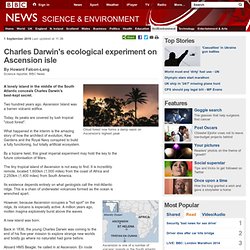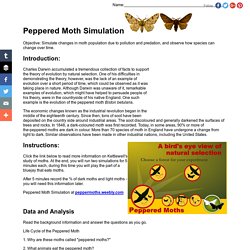

Charles Darwin's ecological experiment on Ascension isle. 1 September 2010Last updated at 11:39 By Howard Falcon-Lang Science reporter, BBC News Cloud forest now forms a damp oasis on Ascension's highest peak A lonely island in the middle of the South Atlantic conceals Charles Darwin's best-kept secret.

Two hundred years ago, Ascension Island was a barren volcanic edifice. Today, its peaks are covered by lush tropical "cloud forest". What happened in the interim is the amazing story of how the architect of evolution, Kew Gardens and the Royal Navy conspired to build a fully functioning, but totally artificial ecosystem. Classroom Activities - Evolving Switches Evolving Bodies. Evolution. Peppered Moth Simulation. Name:______________________________________________ Objective: Simulate changes in moth population due to pollution and predation, and observe how species can change over time.

Introduction: Charles Darwin accumulated a tremendous collection of facts to support the theory of evolution by natural selection. One of his difficulties in demonstrating the theory, however, was the lack of an example of evolution over a short period of time, which could be observed as it was taking place in nature. Natural Selection - Natural Selection, Evolution, Mutation. Evolution. Extraordinary Adaptation.